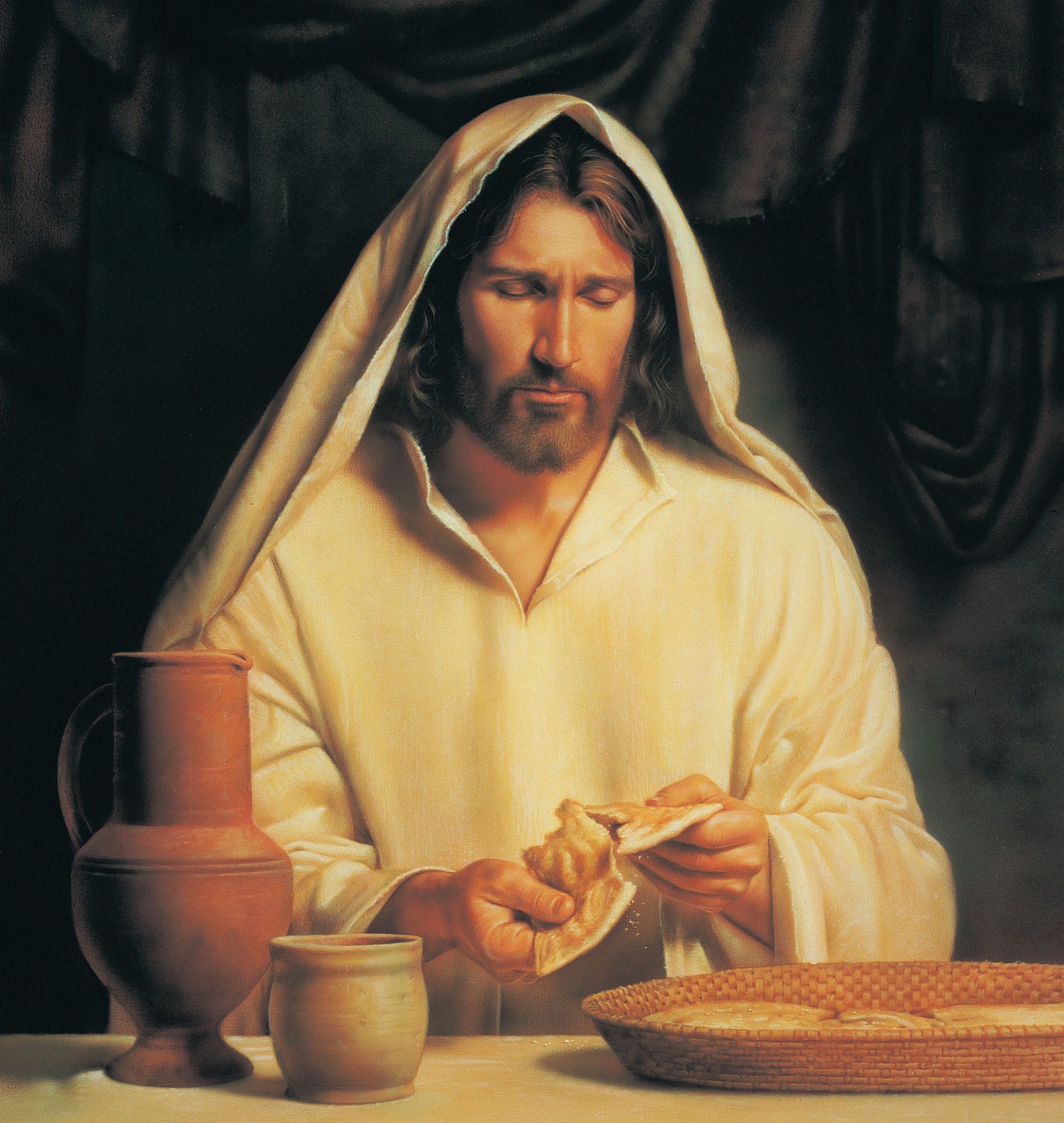
The Lord's Prayer Deconstructed
The disciples asked of Jesus a seemingly simple yet profound request. They wanted Him to teach them how to pray. They could clearly see that Jesus was praying in a unique way that caused God to grant His requests. So it made sense that if He taught them how to pray, they could expect the same results. Traditionally, the Jews and pagans used well composed and approved memorized prayers. This method of praying is still used by all of the world’s major religions with the exception of the protestant church. The term protestant is derived from the word protest. This term was used to identify those congregations that followed the lead of Martin Luther in 1517 A.D. and protested against ninety five Scripturally unsupported practices of the Catholic Church.

Jesus recited to the disciples what has come to be known as The Lord’s Prayer. There are two important points to be made when considering this prayer. First, Jesus composed a prayer for His followers to use as a template. Second, Jesus originally existed eternally in a spiritual form known in scripture as the Word of God (John 1:1-2). His earthly physical body was uniquely created part human from Mary and part divine from God the Father by way of the power of the Holy Spirit. Thus, being part of the Godhead, His prayers to God the Father and the Holy Spirit was very different in style and effect than that of a follower. When Jesus prayed, it was a staff meeting. When we pray, we are talking to our Creator. The prayer He created is designed to be a pattern or a model to be used and expanded on by believers. It touches upon the major points that a prayer by a creation to their Creator should contain. It addresses the current spiritual earthly Church Age Kingdom, the eternal Spiritual Kingdom of God in Heaven, and the future physical earthly Kingdom Age in which the Godhead reigns over all creation only now from the New Jerusalem located on the earth (Revelation 21:1-7).
So, Jesus is teaching us the rudiments of how we should pray to God the Father and not necessarily the way Jesus prayed to God and His response to Jesus' requests. This was because the Spirit of Jesus was the eternal Word of God and His physical biological Father was God the Father. Thus, He had a very unique connection to God the Father. This understanding is backed up by Jesus starting off this prayer by literally saying, “This, then, is how {you} should pray” (Matthew 6:9).
Jesus also said that they should not pray in public with loud exaltations accompanied with exaggerated body genuflecting. Nor should they wear elaborate prayer shawls or clothing designed for self-aggrandizement as did the pompous, wealthy and hypocritical religious leaders looking for public attention and adoration. Also, they should not pray like the superstitious pagan gentiles with memorized and supposed secret chants to be repeated ad nauseum. They were to pray privately, continuously throughout the day, and in a conversational manner to a personal and loving Father. The prayer Jesus gave us as a model is as follows.

Our Father who is in Heaven, The word “our” literally refers to the followers of God when praying together in fellowship. A single believer would say, My Father who is in Heaven. But figuratively this phrase also refers to all mankind as all are created by and in the image of the Father. The word Father is recognizing that one is praying to the one true Creator God who resides in Heaven and not some false pagan god under the earth or unknowable spirit force emanating from space. The word Heaven literally refers to the Spiritual Kingdom God created by and from which He rules. God does not rule from deep in the earth, or from the oceans or on top of a mountain. But the term Heaven figuratively reflects the astonishing way that a physically created prayer can transcend physical boundaries and be heard in the spiritual realm of Heaven by God. This phrase is like a prayer envelope which has a name followed by an address on it.
Hallowed be your name. The word “Hallowed” means to set apart or to make Holy. Jesus is stating that God is literally Holy and therefore His name is and should be considered as hallowed. But figuratively, it is clear that man is only to use the name of God in complete reverence due to who this name represents. God’s name should never be used casually as part of an oath or attached to a phrase in order to give the phrase more impact on the listener. It was also a tradition, then as now, that someone meeting another of a higher rank would include a blessing on that person as part of a greeting.
Actually, God does not have a name. This is because a name is only necessary when there are two or more entities that need to be differentiated between. But God exists whether there are or are not other entities. Therefore, He does not need a name. An example of this was when Moses asked God for His name. He did this so that he could use it when He met with the Jewish tribal leaders in Egypt concerning the organizing of the Exodus. God’s answer was, “I Am That I Am:” or simply “I Am”(Exodus 3:14). Jesus may have used a secret name for God known only to Him (John 17:25-26). And we know that God had a secret name for Jesus (Revelation 19:12). We also know that Jesus referred to His Father as Abba which translated from Greek is papa or daddy (Mark 14:36). Jesus told followers to now start referring to God as Father because He knew in advance that His sacrifice would consummate a new more perfect covenant that would establish and allow a more familial relationship between God and mankind. Now, for the first time since Adam, a person can have a personal, intimate relationship with God as does a child with its loving Father.

Thy Kingdom come, John the Baptist had announced that the Kingdom of God was at hand (Mark 1:15). Jesus literally brought the opportunity to establish the physical Kingdom of God on earth with Him as its King. This prophesied event is currently celebrated with the Jewish Feast of Sukkot or Booths when God resides with mankind. But, because His offer was rejected, He took the opportunity of establishing God’s physical Kingdom on earth back with Him to Heaven. However, Jesus figuratively set up God’s Spiritual Kingdom on earth by establishing the two thousand year Church Age. The term Thy Kingdom come is also prophetic in that is concerns both the Second Coming of Christ and His one thousand year Millennial Reign on earth followed by the actual physical presence of God the Father on earth (Revelation 20:4). So Jesus uses this phrase as an encouragement to His followers to keep in mind both the current and future Kingdom Ages. Thus, while they are to be focused on spreading the Good News of salvation and eternal life through faith in Christ, they should also live lives in obedience to the principles of His teachings through words and actions.
Thy will be done on earth, as it is in Heaven. This phrase makes it clear that while God reigns supreme in Heaven, His will is not followed on earth to its fullest extent …yet. Followers need to understand that it is the will of God and not that of mankind that rules creation. With the fall of Lucifer, God also expelled one third of the angels who believed as he did (Revelation 12: 4, 9). This shows that both the angels and mankind were apparently endowed with the inalienable right to freely chose to follow God or be their own god and follow their individual desires. Our prayers serve as a pledge to God and a reminder to always be in His will and focus on the current earthly Kingdom program. This will bring us future rewards and great joy knowing we have brought family, friends and colleagues into eternal life beyond the grave (Matthew 25:21).

Give us today our daily bread. This phrase literally refers to having daily access to food. Today we live in a country with an overabundance of food. But in ancient times, ninety percent of people lived from day to day in constant search for firewood, clean water and some form of protein to alleviate continuous hunger pangs. Their daily food consisted mostly of beans/rice, bread and water. This is still the same diet of most people living in third world countries. This is also the main reason why seven out of ten children in ancient times did not survive to adulthood. Figuratively, this phrase refers to a daily study of scripture which serves as spiritual sustenance. In other words, when we pray we talk to God. When we study Scripture God talks to us. We are to acknowledge God as the provider of all our needs. But while we trust that God will provide as needs arise, we should understand that we may not necessarily have our needs met in advance or in abundance. An example of this was when God provided manna for the children of Israel during the Exodus. Fresh manna was provided daily but any stored immediately rotted. So, while the Jews were always only a day away from starvation, through faith, they were fed for decades. Prophetically, Jesus promised us that in the Kingdom Age, God will provide for all the needs of His children.
Forgive us our debts, as we also forgive our debtors. The word debts appears only here and in the Book of Romans (Romans 4:4). It is clear the word means sins and that to sin places a person in a debt relationship with God. Jesus gave a parable on this concept of debt to teach about sin and forgiveness (Matthew 18:21-35). However, Jesus is not saying that our ability to forgive others is a prerequisite for receiving God’s forgiveness. But, those who forgive and do good works to help others will recieve rewards in the life to come. Scripture is clear that there is nothing we can do to merit God’s judicial forgiveness. This is why God established a new covenant based entirely on the self-sacrifice of Jesus. Imperfect mankind had proven repeatedly that it was completely incapable of keeping the perfect laws of God perfectly. So, God established a more perfect covenant by taking sinful mankind out of the equation and putting the onus on Jesus. Having perfectly satisfied the Mosaic Law, He voluntarily sacrificed Himself on behalf of the sins of mankind and His blood consecrated the covenant. His public sacrifice was publicly deemed acceptable by God as shown by way of His raising Him from the dead. Now it is Christ who reigns as High Priest and the Messiah and Savior of mankind.(Romans 5:6-8; Ephesians 2:8-9).
So, a person does not obtain forgiveness by forgiving others. Only Christ has brought the offer of salvation to all mankind. But, a person exhibits a spiritual change by forgiving others. All member of God’s family are expected to forgive others. When we fail to forgive, we fail to live up to God’s expectations and stunt our spiritual growth. The understanding that you have received God’s forgiveness should in turn motivate a believer to forgive others. If not, the person has become a hypocrite in the eyes of God. However, to forgive someone for causing you harm does not mean that God has forgiven them. Forgiveness on your part simply means that you have made God happy because you are keeping your promise to Him. God is happy to see that you have broken free from the chains of hate that were once dragging both you and your offender down.
Jesus wants His followers to take prayer time to reflect on those moments during the day when they became impatient or angry. He wants us to reaffirm our resolve to do better the next time and then move forward in our journey of spiritual growth knowing we are always forgiven. In this way we personalize our prayers and are not asking for forgiveness because forgiveness has already been provided by Christ. Instead, we are thanking God for creating a forgiveness mechanism and letting Him know that we are always trying to do better and stay in His will.
And lead us not into temptation, but deliver us from evil. The preceding request was for forgiveness. This request is for deliverance from temptation and evil, or help preventing sins and thus needing ever more forgiveness. In other words, we are praying simultaneously for both forgiveness and deliverance in dealing with the power of sin (I John 1:7-9). This phrase also reflects the anticipation of the coming Kingdom Age when sin is finally destroyed and we can live in peace with nature, our fellow man and our Creator (Isaiah 11:6-9). With the indwelling of the Holy Spirit, a believer will find they need to confess less and less concerning apologies for over reactions and more for protection. Over time, we can learn to recognize and avoid temptations, but must continually keep our guard up concerning spiritual dangers (Matthew 24:42; 25:13; 26:41).

There are some translations of this phrase that end with the words, “… deliver us from the evil one.” (Matthew 6:13). Satan is a real spiritual entity with certain powers that include the ability to try and corrupt a person’s moral code. Satan is not focused on those who are unsaved as their ultimate judgements and rewards are set. Instead, he is focused on the saved because, to have them fall into temptation, is to emotionally hurt God as their Father. Satan also knows that the spiritual growth of a person causes them to produce physical fruits of the Spirit. And He knows that these fruits brought about by a person helping others will be rewarded with positions of governance in the coming Kingdom Age. This infuriates Satan as he was once the most perfect and powerful entity in all Creation. But, because of pride and a desire to be worshipped, he was summarily stripped of his ranking and the vast majority of his power. So, the idea that an inferior creation of God will be given power above his own has driven him insane with envy, hatred and rage towards God and His children.
For Satan, the secret of life is only about enjoying the passage of time. For God, the secret of life is spiritual growth. This is why Satan takes great delight in tempting followers of Christ to focus on worldly possessions and pleasures of the flesh. Yet, a mature follower will be able to easily discern these dangers or stumbling blocks and avoid them. Still, God encourages us to pray about the specifics of these concerns. For when we make specific requests to God, it allows us to better identify His specific responses.
God does not cause bad things to happen to people. Bad things happen because we currently live in a fallen world. But God does use bad circumstances to help a person in their journey of spiritual growth. God also regularly steps in and prevents bad situations from escalating. The bottom line is that a believer is to always keep their eye on the brass ring of eternal life and never look back … only forward (Philippians 3:13-14)
For yours is the kingdom, and the power, and the glory, We are now in the process of closing a prayer. We should end with a final acknowledgement that the one true Creator God is sovereign over all physical and spiritual creation. This would include all kingdoms both past, present and future. We should acknowledge that we understand only God has the power of creation and He, as Creator, should rightfully and gratefully receive all glory and praise or thanks from what He has created. Without God, all things would immediately cease to exist. He literally keeps all things in existence. There is only one Creator who has brought into existence many creations. There should never be a time that a creation should conclude that it is greater than its Creator or that it is not in need of its Creator. This was apparently the downfall of Satan. As the most beautiful creation of God, he was responsible for presenting the praise that emanated from creation to the Godhead. However, at some point he concluded that as the most beautiful and important angelic creation, he also deserved praise. This tragic character flaw of pride was perceived by God and he was immediately demoted in power and position (Isaiah 14:12-14).
“For ever and ever.” The words for ever mean until the end of time. By adding a second forever it not only strengthens or adds resolve the first forever, but now creates an understanding that we are talking about existence beyond time referred to as eternity. At the end of the Millennial Reign of Christ, all mankind becomes immortal, thus the recognition of time ends and an eternal series of Ages upon Ages begins. Because of physical immortality and the understanding that eternity does not end, there is now no more need to keep time.
When scripture states that God is eternal, this means that He had no beginning and He has no end. This concept is at odds with physical existence in that all living things have a beginning and an end. But because God exists outside of the physical time-space continuum, the laws of physics do not apply to Him. Thus, we are acknowledging at the end of a prayer that we have faith we will one day inherit eternal existence as a Child of God. Please see Paper, “Time Ends and Eternity Begins”
“Amen.” This word simply means So be it or Truly or It is so.
If you enjoy the information provided on this site, please consider making a donation of any amount to help continue its production. Donate Now